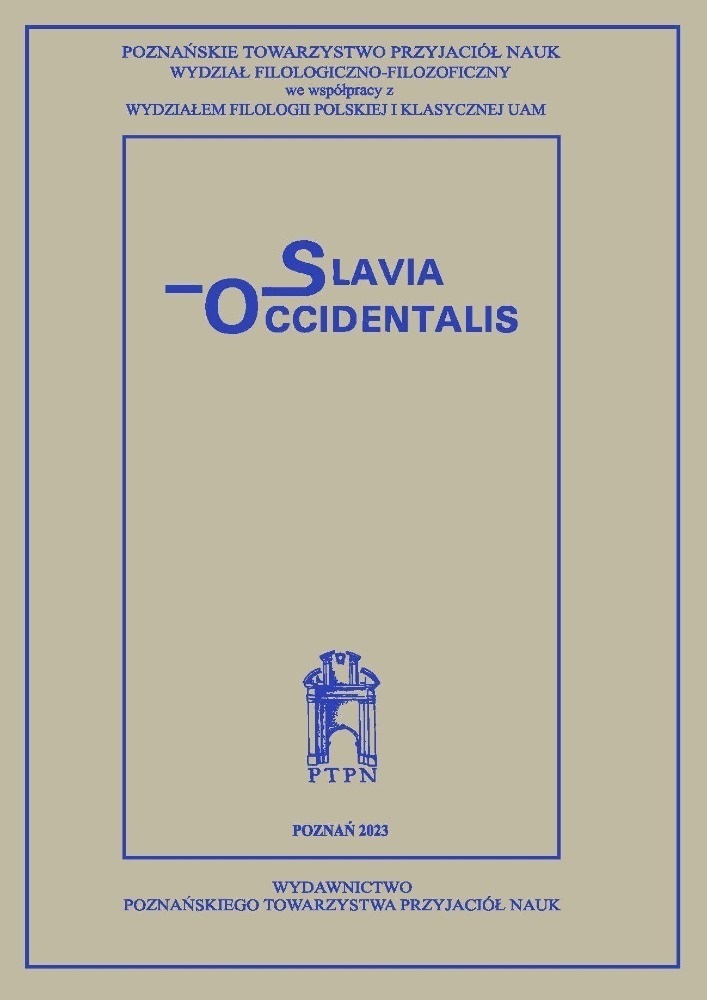Abstrakt
The title is not only a paraphrase from Kant, but also a direct citation from Tsvetaeva. These are the words she used in her letter to Charles Vildrak from 1930 ( after Rilke’s death): „Rilke, der nicht Dichter ist, sondern die Dichtung an sich”. The article about Elegy to Marina Tsvetaeva-Efron is a supplement and some kind of counterpoint to my attempt to describe the cycle of great Duineser Elegien which I have undertaken in my book Rycerz i śmierć. O „Elegiach duinejskich” Rainera Marii Rilkego. The elegy to Tsvetaeva is a separate case, written later (1926), the poem was not planned as reference to the cycle from Duino, but it is connected with Rilke’s project of modernization of the elegy as a literary form, it completes the metamorphosis, that the genre has gone in his work and – wider – in the 20-th century. As Duineser Elegien were philosophical elegies, Elegy to Maryna Tsvetaeva-Efron is his own original contribution to the history of a love elegy (here – in association with the German culture – Goethe and his Römische Elegien is a necessary reference). The lecture of this elegy opens another inspiring theme of the love relationship (or kind of dis-relationship, un-realtionship, Tamara Topolanek calls it Unbeziehung) of two great poets (Polish readers know their relationship from the book titled Listy troiste – edition of correspondence between Marina Tsvetaeva, Borys Pasternak and Rainer Maria Rilke). The heat and the rarity of their love relationship touches the death itself and even cancels it for a while. Their relationship is inscribed in a trialog, in “an epistolary romance” – as Jan Zieliński, a Polish analyst of their correspondence, calls it. Elegy to Marina Tsvetaeva-Efron is directly linked with the cycle from Duino by dedication, which Rilke has written on the copy of Duineser Elegien and sent to the Russian poet on 3rd of May 1926 (more than half a year before his death) from Val-Mont. In my article I am describing the correlations between the late poem of Rainer Maria Rilke and his meeting with Tsvetaeva documented in their letters, and I am also comparing poetics of a love elegy and a love letter (I am asking if they have any common features). This comparative approach rises (hopefully) the problem about the transpositions of important content between one’s poetry and personal documents.Bibliografia
M. Cwietajewa, B. Pasternak, R. M. Rilke, Listy (1926). Przeł. J. Juryś, A. Mietkowski, A. Zagajewski. „Zeszyty Literackie” 1986, nr 14, s. 63–109.
M. Böhme, Rilke und die russische Literatur neue Beiträge mit besonderer Berücksichtigung der Rezeption Rilkes in Russland. Wien 1966.
G. K. Epp, Rilke und Russland. Peter Lang. Frankfurt am Main. Bern. New York. 1984.
J. Lehmann, Übersteigen und übersetzen. Zum Problem der Grenzüberschreitung bei Rainer Maria Rilke und Marina Cvetaeva. W zbiorze: Rilke und die Weltliteratur. Hrsg. von M. Engel und D. Lamping. Düsseldorf-Zürich 1999.
Rainer Maria Rilke und Marina Zwetajewa. Ein Gespräch in Briefen. Hrsg. von K. M. Asadowski. Frankfurt am Main und Leipzig 1998.
T. T opolanek, Rainer Maria Rilke – Marina Cvetaeva: eine „Un-Beziehung”? Salzburg 1995.
J. Zieliński, Listy troiste. „Zeszyty Literackie” 1986, nr 14, s. 57–62.
